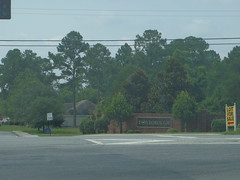Received yesterday,
The Grassroots Handbook Against School Consolidation:
The Truth About Unification/Consolidation of the Valdosta/Lowndes
School Systems
By David E. Mullis, J.D., LL.M., October 12, 2011.
It’s a 43 page exhaustive compendium of all the statements
against consolidation by both school boards, the Valdosta City Council, etc.,
together with detailed debunking of every argument CUEE has made.
I think this passage on page 3 sums it up:
 In other words, we can offer a great education, provide incentives for
students to perform, make modifications to education to help students
succeed, and provide technical help, but if the child is homeless,
left home alone for long periods of time, living in a high crime area,
living in a home with substance abuse, or just downright defiant, there
is only so much the school can accomplish in helping these students
succeed. Good parental, home and community environments are critical to
the success of underprivileged children.
In other words, we can offer a great education, provide incentives for
students to perform, make modifications to education to help students
succeed, and provide technical help, but if the child is homeless,
left home alone for long periods of time, living in a high crime area,
living in a home with substance abuse, or just downright defiant, there
is only so much the school can accomplish in helping these students
succeed. Good parental, home and community environments are critical to
the success of underprivileged children.
Therefore, CUEE and the Chamber of Commerce’s efforts are focused on
the wrong methods of improving our school statistics. Unification will
not accomplish any of their stated goals, but will create an enormous
financial burden on the community and its families during this time of
recession and high unemployment. The business community and volunteer
organizations should instead focus on providing educational awareness
and success clinics in low income areas. They should organize efforts
to reduce poverty by bringing in industry with good wages and sponsoring
basic community literacy and vocational training and tutoring. They should
focus on programs to promote the value of education. They should organize
drug awareness and rehabilitation programs in low income areas. They
should focus their efforts in decreasing poverty. They should focus on
encouraging community diversity. If they will do this, the educational
problems will take care of themselves in good systems like Valdosta
and Lowndes.
However, CUEE and the Chamber have insisted on pushing forward with their
unification agenda despite the certain negative effect it will have on
the community and the education of our children. They deny there will be
any negative effect, but they have no personal accountability if they are
wrong. They ignore all relevant studies and dismiss the results as being
misleading. Then they state their own misleading and false assertions
and claim them to be FACTS.
Indeed, what qualifies the Chamber of CUEE to talk about education?
Judging by their track record, nothing does.
This Handbook is a great resource, and I applaud David Mullis for
producing it.
-jsq
Public Citizen says kudos to the City of Austin and Austin Energy for their vision and efforts in completing this project. Given that the State Climatologist is warning us that Texas can expect up to 5 more years of the current drought cycle, this project came just in time to help provide our community with drought–proof electricity during the peak use times — that will come in handy next summer.
 Remember we already discovered this right here in Valdosta and Lowndes County? The Wiregrass Solar commissioning was a popular event, with many critics of the Industrial Authority lavishly praising it for the solar plant. Nobody complained about living near a solar installation. How about some more clean industry?
Remember we already discovered this right here in Valdosta and Lowndes County? The Wiregrass Solar commissioning was a popular event, with many critics of the Industrial Authority lavishly praising it for the solar plant. Nobody complained about living near a solar installation. How about some more clean industry?


